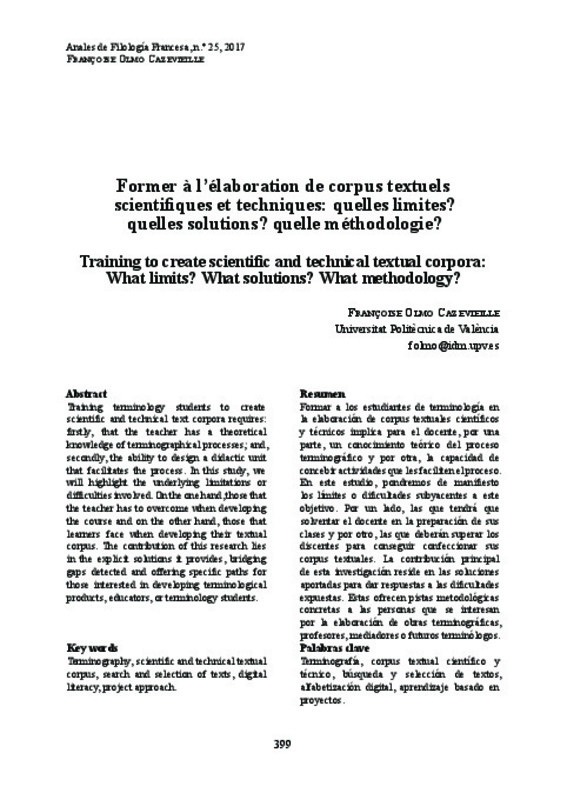JavaScript is disabled for your browser. Some features of this site may not work without it.
Buscar en RiuNet
Listar
Mi cuenta
Estadísticas
Ayuda RiuNet
Admin. UPV
Former à l élaboration de corpus textuels scientifiques et techniques: quelles limites? quelles solutions? quelle méthodologie?
Mostrar el registro sencillo del ítem
Ficheros en el ítem
| dc.contributor.author | Olmo Cazevieille, Françoise
|
es_ES |
| dc.date.accessioned | 2018-06-07T04:22:12Z | |
| dc.date.available | 2018-06-07T04:22:12Z | |
| dc.date.issued | 2017 | es_ES |
| dc.identifier.issn | 0213-2958 | es_ES |
| dc.identifier.uri | http://hdl.handle.net/10251/103486 | |
| dc.description.abstract | [EN] Training terminology students to create scientifc and technical text corpora requires: frstly, that the teacher has a theoretical knowledge of terminographical processes; and, secondly, the ability to design a didactic unit that facilitates the process. In this study, we will highlight the underlying limitations or difculties involved. On the one hand, those that the teacher has to overcome when developing the course and on the other hand, those that learners face when developing their textual corpus. The contribution of this research lies in the explicit solutions it provides, bridging gaps detected and ofering specifc paths for those interested in developing terminological products, educators, or terminology students. | es_ES |
| dc.description.abstract | [ES] Formar a los estudiantes de terminología en la elaboración de corpus textuales científicos y técnicos implica para el docente, por una parte, un conocimiento teórico del proceso terminográfco y por otra, la capacidad de concebir actividades que les faciliten el proceso. En este estudio, pondremos de manifiesto los límites o dificultades subyacentes a este objetivo. Por un lado, las que tendrá que solventar el docente en la preparación de sus clases y por otro, las que deberán superar los discentes para conseguir confeccionar sus corpus textuales. La contribución principal de esta investigación reside en las soluciones aportadas para dar respuestas a las dificultades expuestas. Estas ofrecen pistas metodológicas concretas a las personas que se interesan por la elaboración de obras terminográficas, profesores, mediadores o futuros terminólogos. | es_ES |
| dc.language | Francés | es_ES |
| dc.publisher | Ediciones de la Universidad de Murcia | es_ES |
| dc.relation.ispartof | ANALES DE FILOLOGÍA FRANCESA | es_ES |
| dc.rights | Reserva de todos los derechos | es_ES |
| dc.subject | Terminografía | es_ES |
| dc.subject | Corpus textual científico y técnico | es_ES |
| dc.subject | Búsqueda y selección de textos | es_ES |
| dc.subject | Alfabetización digital | es_ES |
| dc.subject | Aprendizaje basado en proyectos | es_ES |
| dc.subject | Terminography | es_ES |
| dc.subject | Scientifc and technical textual corpus | es_ES |
| dc.subject | Search and selection of texts | es_ES |
| dc.subject | Digital literacy | es_ES |
| dc.subject | Project approach | es_ES |
| dc.subject.classification | FILOLOGIA FRANCESA | es_ES |
| dc.title | Former à l élaboration de corpus textuels scientifiques et techniques: quelles limites? quelles solutions? quelle méthodologie? | es_ES |
| dc.type | Artículo | es_ES |
| dc.rights.accessRights | Abierto | es_ES |
| dc.contributor.affiliation | Universitat Politècnica de València. Departamento de Lingüística Aplicada - Departament de Lingüística Aplicada | es_ES |
| dc.description.bibliographicCitation | Olmo Cazevieille, F. (2017). Former à l élaboration de corpus textuels scientifiques et techniques: quelles limites? quelles solutions? quelle méthodologie?. ANALES DE FILOLOGÍA FRANCESA. (25):399-420. http://hdl.handle.net/10251/103486 | es_ES |
| dc.description.accrualMethod | S | es_ES |
| dc.description.upvformatpinicio | 399 | es_ES |
| dc.description.upvformatpfin | 420 | es_ES |
| dc.type.version | info:eu-repo/semantics/publishedVersion | es_ES |
| dc.description.issue | 25 | es_ES |
| dc.relation.pasarela | S\352023 | es_ES |






